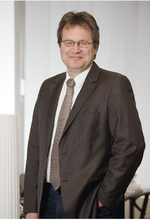
Dear Readers,
In April 2015, I took over the position of Vice-Rector for Research, Junior Academic Staff and Knowledge Transfer at a very interesting and exciting time for our University. In my new capacity, I am delighted to take this opportunity to introduce the Research Report for the past year.
The positive trend was already apparent in 2015, with the University of Duisburg-Essen (UDE) again making it into the Times Higher Education Ranking as one of the world’s best 100 universities under 50 years old. That was an improvement of eight places on the previous year and a further 42(!) this year, which currently puts us in 17th place. The ranking recognizes universities that have developed rapidly and successfully in a short time and are seen as rising stars in higher education.
The University of Duisburg-Essen also performed very well in the 2015 European U-Multirank rankings of higher education institutions. The UDE was placed towards the top end in virtually all categories, in particular achieving top scores in the Research category (research publications, PhDs, research funding, and patents).
As the research at our young and dynamic institution continues to go from strength to strength, the UDE can look back on an eventful year. Outlined below is a selection of the research highlights of 2015.
The UDE was successful in no fewer than three German Research Foundation (DFG) collaborative research projects last year. The DFG Research Unit 2284 “Model-Based Scalable Gas Phase Synthesis of Complex Nanoparticles” was launched with Prof. Dr. Christof Schulz, Faculty of Engineering, as its coordinator. The DFG also approved two Priority Programmes (SPP): SPP 1748 “Reliable Simulation Techniques in Solid Mechanics. Development of Non-standard Discretization Methods, Mechanical and Mathematical Analysis”, coordinated by Prof. Dr.-Ing. Jörg Schröder, Faculty of Engineering; and SPP 1786 “Homotopy Theory and Algebraic Geometry”, whose coordinator is Prof. Dr. Marc Levine, Faculty of Mathematics.
In 2015, the UDE also continued to build its reputation for excellent early career support and training. The DFG Research Training Group (RTG/GRK) 2167 “User-Centred Social Media” began its work with Prof. Dr.-Ing. Norbert Fuhr, Faculty of Engineering, as its coordinator. RTG 2098 “Biomedicine of the acid sphingomyelinase/acid ceramidase system” also received DFG approval; its coordinator is Prof. Dr. Erich Gulbins, Faculty of Medicine.
For the past two years, outstanding medical students have been able to take part in a two-semester training programme within ELAN (Essener Ausbildungsprogramm Labor und Wissenschaft für den ärztlichen Nachwuchs), a doctoral school of the Medical Faculty at University Hospital Essen.
Cooperation in early career education and training has also intensified with the Max-Planck Institutes in the local region. The International Max Planck Research School (IMPRS) “Reactive Structure Analysis for Chemical Reactions” (RECHARGE) was established jointly by the Ruhr University Bochum, University of Duisburg-Essen, University of Bonn and the neighbouring Max-Planck-Institut für Kohlenforschung and the Max-Planck-Institut für Chemische Energiekonversion (MPI CEC). Doctoral training commenced in the autumn of 2015.
A further International Max Planck Research School is “Interface Controlled Materials for Energy Conversion” (IMPRS-SurMat). It connects the excellent research conditions offered by the partner institutions (MPI für Eisenforschung, MPI für Kohlenforschung, MPI für Chemische Energiekonversion, Ruhr University Bochum, University of Duisburg-Essen) with an intensive and interdisciplinary curriculum and is conducted entirely in English.
2015 also marked the start of work by what is now the fourth cohort of the Global Young Faculty, an initiative of Stiftung Mercator in collaboration with the University Alliance Ruhr (UA Ruhr) and the Mercator Research Center Ruhr (MERCUR). The “Model Regulations Governing Doctoral Proceedings at the University of Duisburg-Essen”, also made available last year, are a further component of support for young researchers and scholars at the UDE.
Another event with an important bearing on the future development of our University came in the publication of the UDE research strategy, which sets out clear thematic priorities with research centres and main areas of interest.
The University Alliance Ruhr continues to make good progress: strong collaborative projects such as the UA Ruhr Research Training Group 2131 “High-dimensional Phenomena in Probability – Fluctuations and Discontinuity”, coordinated by Prof. Dr. Peter Eichelsbacher from Ruhr University Bochum, reflect the high scientific impact of “Materials Chain”, the UA Ruhr’s first “key program”. In it, over 200 researchers from the Ruhr region explore potential improvements to and applications of modern materials. This first UA Ruhr research priority, funded by the Mercator Research Center Ruhr (MERCUR), covers every stage of modern materials sciences from the design, manufacture and treatment of materials to their characterization and processing in production.
A final milestone to report is the launch of the new InnovationHUB Duisburg-Essen (IDE) towards the end of 2015. The IDE promotes and supports the development and implementation of product ideas and business concepts originating at the University of Duisburg-Essen. High-tech products, social projects or innovative services – the IDE has programmes, resources and networks to suit them all.
In short, the UDE is clearly in a very promising position, be it in research, training new generations of researchers and scholars, knowledge transfer or start-ups. The contributions from the main research areas and selected institutes published in the present report provide some excellent examples testifying to this.
I would like to end by expressing my special thanks to all those at the UDE whose successful research is helping us to build a national and international reputation.
I very much hope that you enjoy reading the 2015 Research Report and find it both informative and inspiring.
Yours,
Prof. Dr.-Ing. Thomas Kaiser
Vice-Rector for Research, Junior Academic Staff &Knowledge Transfer

